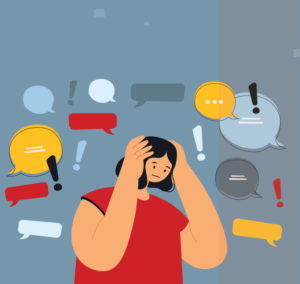ADHD on TikTok
Attention Magazine August 2022
Battling Misinformation on Social Media
 Social media PROVIDES A PLACE for teens and young adults to share what it is like to live with ADHD. While this has led to more awareness about ADHD, and potentially more acceptance, there’s so much information swirling around on social media that it can be hard to separate facts from myths.
Social media PROVIDES A PLACE for teens and young adults to share what it is like to live with ADHD. While this has led to more awareness about ADHD, and potentially more acceptance, there’s so much information swirling around on social media that it can be hard to separate facts from myths.
TikTok videos using the ADHD hashtag have 11.4 billion views. Some ADHD experts have joined the ranks of TikTok users, like psychiatrist Edward Hallowell, MD, the author of Driven to Distraction. Dr. Hallowell regularly posts videos and strategies for building on strengths while addressing the challenges of ADHD. “I have been doing all I can to spread my strength-based approach on ADHD for the last four decades, and TikTok provides a new and very creative platform to continue to do that,” he says.
Acknowledging the misinformation about ADHD on TikTok, Dr. Hallowell credits it as his reason for joining. “Where there was a gap was a medical expert perspective, and so I decided to create some videos providing this,” he says. “TikTok is perfect for the ADHD audience because the videos are short, punchy, and entertaining.” He warns that not all content on TikTok is factual, nor does it replace seeing a doctor.
Viral misinformation
Researcher Anthony Yeung, MD, and colleagues viewed one hundred of the most popular TikTok videos on ADHD. They found that these videos were highly relatable, but approximately 52 percent were misleading. Most videos were uploaded by TikTok users who are not healthcare practitioners. Dr. Yeung found that the videos posted by healthcare practitioners were better quality and contained more useful information.
ADHD professionals like Dr. Yeung worry about the large number of videos that contain misinformation, leading some TikTok users to self-diagnose and seek treatment they may not need. “Although social media can reduce mental health stigma and improve health literacy, there is also concern about misinformation and the potential for illness/health anxiety,” he writes.
Experts refer to this as cyberchondria and attribute it to the volume of unmoderated, user-generated content. Social media algorithms tend to show users similar videos, which can increase the spread of misinformation. While platforms like TikTok offer both good and misleading content, people should not consider it a reliable source for medical information.

What is TikTok?
TikTok is a social media app that consists of short videos—usually only 15-60 seconds long—created by users. Launched in 2016 by the Chinese start-up tech firm ByteDance, the app has been downloaded more than 2.5 billion times. By early 2022, the app had about one billion global daily users; 69% of users are between the ages of 13 -14 and 60% of users are female.
Learn more: https://www.investopedia.com/what-is-tiktok-4588933
Countering misinformation
Some ADHD professionals viewed the viral misinformation with growing concern and decided to take to TikTok themselves with fact-based content. Sasha Hamdani, MD, a psychiatrist in Kansas City, Kansas, learned about TikTok through her patients. At first, she was impressed that there was so much discussion about mental health, but after seeing videos that promoted myths about ADHD, Dr. Hamdani decided to post her own videos.
“There was some good information, some bad information, and some absolute garbage,” she recalls. Dr. Hamdani points out some popular myths circulating on TikTok, including “ADHD medication is addictive” and “ADHD is a fancy term for laziness.” She highlights the facts in her own videos, which include topics such as “ADHD is more than just a focus problem” or “how ADHD symptoms can fluctuate with hormones.”
Several mental health agencies are watching advertisements on TikTok from for-profit telehealth companies with growing concern, noting that they contain false information. Media Matters for America, a nonprofit organization that monitors media outlets and social media, has also been studying the rise of short videos in social media. Their researchers found that in addition to misleading user-uploaded videos, misleading advertisements are targeting teens and young adults.
“The ads seem to be capitalizing on the TikTok phenomenon of ADHD self-diagnosis, in which some creators oversimplify the disorder,” it stated in one report, “leading viewers to try to decide themselves whether they have the disorder, sometimes incorrectly. This can push users to inappropriately seek ADHD medication, which can have dangerous side effects if used improperly.”
Some of the misleading ads discussed in the report were for a telehealth company whose ads were banned earlier this year because they promoted negative body images. The company’s ads about ADHD have remained on TikTok, however.
Separating myth from fact
Given the popularity of TikTok and other short-video platforms, how can you determine what information is factual? TikTok now includes warnings with videos that cannot be verified as factual. But not all videos are fact-checked. If a video is not verified and a user tries to share it, a pop-up warns them that they will be sharing misinformation.
It’s a good idea to consider whether the content you encounter on short video platforms is someone’s personal experience or a video uploaded by a healthcare practitioner. And while you can learn about ADHD symptoms, self-diagnosis is always a bad idea. Bring what you’ve learned to your own medical professional or make an appointment with an ADHD specialist for an evaluation.
Dr. Hamdani considers TikTok a great resource that helps to reduce stigma surrounding certain health conditions when used with caution. “Being a content generator on TikTok is not something I predicted,” she says, “but I’ve found that the ADHD and mental health community is so vocal, supportive, and empowering. For someone who has struggled with ADHD, creating these videos, interacting with followers, and absorbing other people’s experiences has been so validating.”
Dr. Hallowell agrees that the ADHD community on TikTok is supportive and that the expert medical advice he shares can be just the push needed by someone who suspects they have ADHD to reach out to their doctor. “The response has been amazing,” he says. “I’ve done about two hundred TikToks now, and they have been viewed millions of times. What is most rewarding are the comments; there are thousands from people of all ages saying they feel seen for the first time or that the videos have prompted them to seek a diagnosis.”
“This is what mental health in general, and ADHD in particular desperately needs: accurate information presented in a way that people will access, enjoy, and benefit from,” says Dr. Hallowell.


 Jami Demuth is a freelance writer and the mother of three neurodiverse children. She is the coordinator of CHADD’s Midwest Regional Center and a health information specialist at CHADD’s National Resource Center on ADHD. Her articles have been featured in the Des Moines Register, the Gazette, HuffPost, ADDitude, The Mighty, and Scary Mommy. An earlier version of this article appeared in ADHD Weekly, the digital newsletter published by CHADD’s National Resource Center on ADHD.
Jami Demuth is a freelance writer and the mother of three neurodiverse children. She is the coordinator of CHADD’s Midwest Regional Center and a health information specialist at CHADD’s National Resource Center on ADHD. Her articles have been featured in the Des Moines Register, the Gazette, HuffPost, ADDitude, The Mighty, and Scary Mommy. An earlier version of this article appeared in ADHD Weekly, the digital newsletter published by CHADD’s National Resource Center on ADHD.